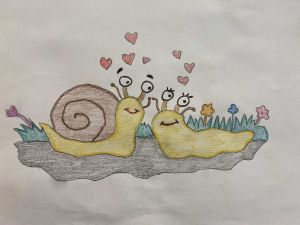Difference between revisions of "A ze parea, karakola eta barea!"
From wikidioms
| (7 intermediate revisions by 3 users not shown) | |||
| Line 17: | Line 17: | ||
|--------------- | |--------------- | ||
|} | |} | ||
[[File: | [[File:Compr compr.jpg|300px|thumb|right]] <!-- drawing: upload it previously --> | ||
==In English== | ==In English== | ||
{| class="wikitable" | {| class="wikitable" | ||
| Line 38: | Line 38: | ||
! style="color:darkgreen" | '''To express the same''' | ! style="color:darkgreen" | '''To express the same''' | ||
! style="color:darkgreen" | '''Related Idioms''' | ! style="color:darkgreen" | '''Related Idioms''' | ||
|- | |- | ||
|[[:Category:Catalan|Catalan]] | |[[:Category:Catalan|Catalan]] | ||
| Line 50: | Line 45: | ||
|- | |- | ||
|[[:Category:Galician|Galician]] | |[[:Category:Galician|Galician]] | ||
|. | |Que parella, o caracol e a babosa. | ||
|Vaia dous! | |||
|Ser unlla e carne. | |||
| | |||
| | |||
|- | |- | ||
|[[:Category:Romanian|Romanian]] | |[[:Category:Romanian|Romanian]] | ||
| | |Ce pereche! <!--literal translation to this language--> | ||
| | |Se potrivesc ca și cuțitul și furculița. <!--To express the same to this language--> | ||
| | |Sunt ca două picături de apă! <!--Related idioms in this language. Use [[ ]] surrounding the idiom--> | ||
|- | |- | ||
|[[:Category:Spanish|Spanish]] | |[[:Category:Spanish|Spanish]] | ||
| Line 75: | Line 60: | ||
|- | |- | ||
|[[:Category:Turkish|Turkish]] | |[[:Category:Turkish|Turkish]] | ||
| | |Ne bir çift, salyangoz ve sümüklü böcek | ||
| | |Birbirini tamamlayan iki sevgiliyi ifade etmek için kullanılan benzetmedir. | ||
| | |Bir elmanın diğer yarısı olmak | ||
|- | |- | ||
|} | |} | ||
Latest revision as of 15:18, 29 March 2023
| Language | Basque |
| Topics | Animals, Friendship |
| Explanation and use (in mother tongue) | Harreman estua duten bi pertsonari buruzko komentarioa: "a ze parea!" bezalakoa. |
In English
| Literal Translation: | What a pair, the snail and the slug. |
| Real meaning: | What a couple! |
| Related idioms: | Birds of a feather flock together. |
In other languages
| Language | Literal translation | To express the same | Related Idioms |
|---|---|---|---|
| Catalan | ... | ... | ... |
| Galician | Que parella, o caracol e a babosa. | Vaia dous! | Ser unlla e carne. |
| Romanian | Ce pereche! | Se potrivesc ca și cuțitul și furculița. | Sunt ca două picături de apă! |
| Spanish | Menudo par, el caracol y la babosa. | ¡Vaya dos! | Vaya dos patas para un banco. |
| Turkish | Ne bir çift, salyangoz ve sümüklü böcek | Birbirini tamamlayan iki sevgiliyi ifade etmek için kullanılan benzetmedir. | Bir elmanın diğer yarısı olmak |
